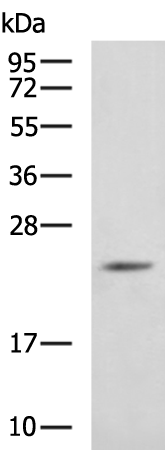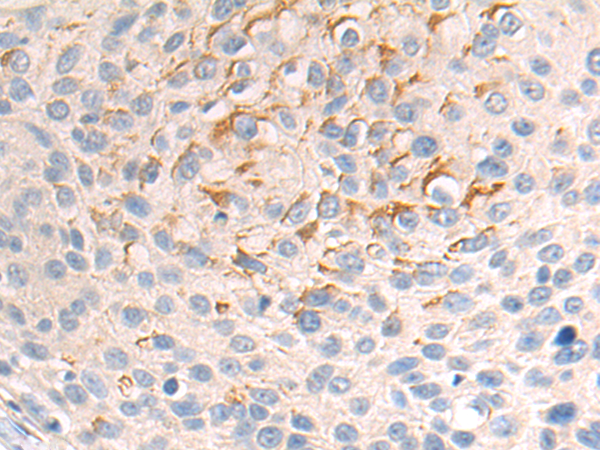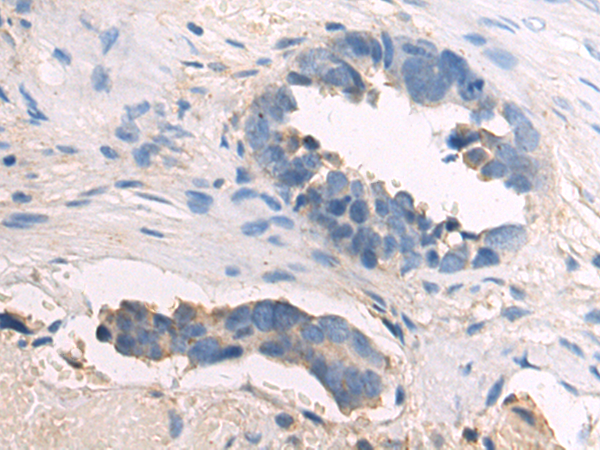


| WB | 咨询技术 | Human,Mouse,Rat |
| IF | 咨询技术 | Human,Mouse,Rat |
| IHC | 1/50-1/200 | Human,Mouse,Rat |
| ICC | 技术咨询 | Human,Mouse,Rat |
| FCM | 咨询技术 | Human,Mouse,Rat |
| Elisa | 1/5000-1/10000 | Human,Mouse,Rat |
| Aliases | ZFGF5; FGF-18 |
| WB Predicted band size | 24 kDa |
| Host/Isotype | Rabbit IgG |
| Antibody Type | Primary antibody |
| Storage | Store at 4°C short term. Aliquot and store at -20°C long term. Avoid freeze/thaw cycles. |
| Species Reactivity | Human, Mouse, Rat |
| Immunogen | Fusion protein of human FGF18 |
| Formulation | Purified antibody in PBS with 0.05% sodium azide and 50% glycerol. |
+ +
以下是关于FGF18抗体的3篇示例参考文献(注:部分信息为示例性概括,实际文献需通过数据库查询验证):
1. **文献名称**:*FGF18 regulates osteogenesis through bone morphogenetic protein signaling*
**作者**:David M. Ornitz 等
**摘要**:研究揭示了FGF18通过激活BMP信号通路促进成骨细胞分化,并利用特异性抗体阻断FGF18功能后,发现小鼠模型中骨形成显著减少,表明其在骨骼发育中的关键作用。
2. **文献名称**:*Anti-FGF18 antibody inhibits tumor growth in colorectal cancer models*
**作者**:Hiroshi Sakamoto 等
**摘要**:该研究开发了一种人源化抗FGF18抗体,证明其可通过抑制FGF18/FGFR信号通路,阻断结直肠癌细胞的增殖和血管生成,在动物模型中显著降低肿瘤负荷。
3. **文献名称**:*FGF18 antibody enhances cartilage repair in osteoarthritis*
**作者**:Anna H. K. Plaas 等
**摘要**:实验发现,靶向FGF18的中和抗体能够减少关节软骨降解,并通过促进软骨祖细胞增殖,改善骨关节炎模型中的软骨修复,提示其治疗潜力。
(注意:以上文献信息为示例,实际引用需查询PubMed、Web of Science等数据库获取真实文献。)
Fibroblast growth factor 18 (FGF18) is a secreted signaling protein belonging to the FGF family, primarily involved in skeletal development, tissue repair, and cellular processes like proliferation and differentiation. It binds to FGFR3 and FGFR4 receptors, activating downstream pathways such as MAPK and PI3K/AKT. Dysregulation of FGF18 is linked to skeletal disorders, cancers, and fibrotic diseases.
FGF18 antibodies are therapeutic or research tools targeting either endogenous FGF18 (to block pathological signaling) or exogenous FGF18 (to enhance its regenerative effects). In oncology, neutralizing antibodies inhibit FGF18-driven tumor growth, angiogenesis, and metastasis, particularly in cancers with FGFR3/4 overexpression. Conversely, agonist antibodies or recombinant FGF18 administration has shown potential in bone/cartilage regeneration, notably in preclinical osteoarthritis models.
Clinical development includes antibodies like HLX22 (anti-FGF18) for gastric cancer and recombinant FGF18 (sprifermin) in Phase III trials for cartilage repair. Challenges include ensuring receptor specificity, minimizing off-target effects, and optimizing delivery for tissue-specific action. Future research focuses on antibody engineering for improved pharmacokinetics and combination therapies with biomaterials or gene editing tools.
×